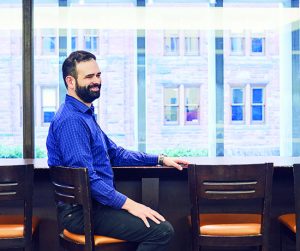A new student services centre will be the place to be on campus
By Jennifer Matthews
Photography by Jaime Hogge
Many of us associate first-day-of-school jitters with the nervous excitement of arriving on campus for the very first time. But for Trinity student Shubhi Sahni, it was returning to campus at the beginning of fourth year that proved most stressful.
“September and October were terrifying,” says Sahni, who will graduate this spring with a double major in English, and Book & Media Studies. “I jumped into classes, and almost right away I also had to decide what I wanted to do next year. I felt really panicked.”
Sahni turned to one of Trinity’s Assistant Registrars, Allison MacDonald, for help. MacDonald, in turn, set up an appointment with Jon Bray, the College’s Career and Academic Advisor, who had just begun in his newly created role.
“Jon talked to me about my goals, looked at my marks, brought up options I hadn’t considered, and helped me with my applications for post-graduate programs,” says Sahni. “It was more than career counselling. He gave me the confidence to pursue my dream of a career in television and print production, which I wasn’t sure was possible.”
Sahni’s instinct to seek help stemmed from her experience in first year, when she found herself struggling to deal with the aftermath of a friend’s suicide. After being offered group counselling through U of T Health (“which I really wasn’t comfortable with,” she recalls), Sahni went to the Trinity Registrar’s office, where MacDonald co-ordinated a team to provide Sahni with one-on-one counselling, academic extensions, and ongoing follow-ups. “Once I reached out, everything started to get better,” she says.
STRENGTHENING STUDENT SUPPORTS
Sahni is not alone in recognizing the connection between her mental health and her happiness and success as a Trinity student. In the 2015 Trinity College Student Survey, nearly half of respondents said their mental health status has negatively impacted their ability to participate in campus life at one time or another.
Over the past three years the College has brought a new focus to expanding the personal resources available to Trinity students. Thanks to a generous gift from Dr. Anne Steacy ’76 to fund the Anne Steacy Counselling Initiative, the College hired Associate Director of Community Wellness Ramata Tarawally, and added a part-time embedded clinical counsellor in 2016. Michael Royce ’68 and Sheila (Northey) Royce ’68, along with other alumni, have also helped to fund the Mental Health Program at Trinity, recognizing its vital role in the Trinity experience. Responding to the need for increased student services was a key priority identified in Trinity’s 2016 Strategic Plan. As part of expanding its student supports, Trinity students now also have access to a part-time learning strategist, and Career and Academic Advisor Jon Bray joined the team in September 2017.
These advisors are part of a larger team of Trinity staff and faculty whose primary purpose is to support students to ensure they achieve their potential. Throughout their time at Trinity, most students will experience a range of connections with members of that team. Some of those interactions will be routine, like paying course fees or loading a meal card. Other meetings will result from unexpected issues or more complex circumstances. All, however, are linked in that they are part of the experience of each Trinity student. But at the moment, many of the College’s student champions are disconnected at various locations around campus.
Making it simpler for students to meet with all of their advisors would save time and increase student awareness of the full range of services available to them. And in some cases, it might mean the difference between reaching out for help and suffering in silence. While Sahni’s struggles as an undergrad may not be unique, her persistence in seeking help seems somewhat rare. She and fellow student James Madhier share stories of friends who have struggled alone with crippling anxiety, financial hardship, and emotional distress. Some of those students sought help after hearing about campus support services through friends. For others, the process of accessing those services was more than they could handle.
Madhier, a third-year student studying Peace, Conflict & Justice, and African Studies, admits to not following through with counselling following a personal crisis. When he learned that accessing help meant scheduling other appointments and accessing outside supports, he says, “honestly, it was such a hassle I just didn’t go.”
Nelson De Melo wants to make sure those kinds of student experiences soon become a thing of the past. Trinity’s Registrar and a 20-year staff member at the College, De Melo was also charged with the newly created role of Director of Student Services in 2017.
De Melo points out that in most cases, when a student comes to a Trinity staff person for help, the issue is multi-faceted. Case in point: A student stops in to the Registrar’s office to drop a course. If staff simply fulfill the administrative aspect of that request, they may be overlooking other important needs—is the student working too many hours to make ends meet, thereby compromising academics? Or perhaps there’s underlying anxiety or a personal crisis that needs to be addressed.
“Students don’t always see the connections between the challenges they’re dealing with,” says Kristen Moore, Trinity’s Dean of Students. “But we can help them make those connections and set them up with the right supports.”
Awareness and collaboration between service providers is key to ensuring that all of a student’s needs are met, says De Melo. To that end, his focus is on shifting all the College’s student services to a more integrated model, one that is “less task-oriented and more student-focused. We’re advisors now.”
So far that shift has been taking place through collaborative programming efforts; more frequent team meetings to foster a consistent, unified approach; assessing services to identify overlaps and gaps; and increased training and referrals between departments. But now it’s time for the next step, says De Melo. “We need to create a one-stop shop for students, a physical space where we can welcome and support students regardless of their needs, and all of our student advisors can work together.”
A STUDENT SERVICES HUB

While De Melo has encouraged bridges between student service providers, some of them are physically disparate, with locations in different buildings, inadequate space, or no space at all. That is why, in tandem with a review of all the College’s spaces, Trinity is moving forward with the concept of an integrated student services centre in the main building at 6 Hoskin Avenue.
The new space will house major services, bringing together the Dean of Students’ office (which includes the Associate Director of Community Wellness), the Registrar’s office (which includes the Career and Academic Advisor), and the U of T embedded counsellor.
Students will be welcomed by a highly trained staff member who will be well-versed in all of the College’s resources. That person will assess the student’s needs and then connect the student with the team member(s) who can help.
“In a student’s life, everything is meshed together,” says Moore. “We need to make it easier for them to access what they need, from loading their meal cards to getting academic support to finding out about student events to accessing health services. We shouldn’t have to bounce them around.”
Moore adds that when a student is in crisis, sending them from one building to another to access different advisors “feels somewhat inhuman.” Even worse, De Melo adds, is the risk that that student simply won’t get the help they need because they can’t face having to go to another building and share a personal story all over again. “Once we have them in front of us we need to do everything we can for them. We’re failing them if we send them elsewhere to find solutions to their problems.”
A PLACE FOR PEERS TO CONNECT
The student services centre will include flexible spaces to help create a hub for students to meet with peer advisors, academic dons, or study groups. It will be situated close to the Academic Resource Centre, which was created in the main building in 2017, and which houses the Writing and Math Centres, and the Trinity Learning Strategist.
“It makes sense for us to be as visible as possible—not only to students, but to everyone who visits the Trinity campus,” says Moore. “Our role is to support students and to connect them with the full range of resources available to them. Working sideby- side as a team will make us even more effective advocates.”
Third-year Political Science major Weston Miller says that while he feels that the Registrar and the Dean of Students go “beyond the call of duty” for Trinity students, having key services spread out in different buildings results in a loss of significance. “We are fortunate to have a wealth of resources at Trinity, including great mental health services. Having them all in one hub would emphasize the importance of each of them. Students shouldn’t have to be making stressful, potentially life-changing decisions and multiple appointments across campus.”
Madhier agrees. “I think the psychological shift for students of having a centre where all student services are located would make students feel like they’re really being taken care of,” he says. He adds that he believes the visibility of such a centre would be especially valuable to students living off-campus, who are less likely to “hear through the grapevine” about the services available to them.
De Melo himself was one of those students. As an undergrad at U of T’s Victoria College in the 1990s, he commuted to and from campus daily—as do 75 per cent of Trinity students today. He admits, with some regret, that he didn’t access the student resources available to him that might have made his undergraduate experience less stressful and more fulfilling.
This new student services centre will not only create a one-stop shop for Trinity’s students, it will also help to address some of the current gaps in “student onboarding,” says De Melo. “Orientation week is very valuable, but we really need to see orientation as a year-long process. A lot of students don’t really have a clue what kinds of help they need until they’ve had a few weeks to settle in. By then they’ve likely forgotten what we showed them in their whirlwind first week on campus. This centre will provide an integrated place for them to have all their questions answered, whenever they come up.”
Says Provost Mayo Moran, “We are entrusted with these students for such a short period of time, at a critical point in their development. It’s our responsibility to do everything in our power to help them achieve their full potential, in mind, body and spirit. Providing a warm and inviting space for all members of the Trinity community—first-years, returning students, families and visitors—will help us clearly communicate the message, ‘Welcome to Trinity.’ ”


Sorry, comments are closed for this post.